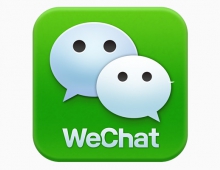
China's Social Messaging App WeChat Censors Users Abroad
China's top social messaging app WeChat censors messages that contain sensitive terms and are sent from overseas to mainland-linked accounts, according to a report.
WeChat accounts registered with a mainland China-based phone number have keywords filtered out or messages blocked anywhere in the world as long they keep the same user name, a study by the University of Toronto's Citizen Lab found. Accounts created abroad, such as through carriers in Hong Kong or the U.S., don?t face the same restrictions, the report said.
The dual systems are crucial to understanding how Tencent Holdings Ltd., which owns WeChat, can expand China's most-popular message service overseas while still complying with domestic government controls on information.
With 846 million active users on WeChat, the company scrapes news posts deemed sensitive and blocks private texts containing certain words in both one-on-one and group chats, Citizen Lab's research on Thursday showed.
Tencent said it complies with local laws and regulations in the countries where it operates.
Citizen Lab's researchers tested 26,821 keywords that have been blocked on other websites. They found that 174 words and expressions, such as "Free Tibet" and "ISIS Crisis," triggered censorship. If those words are detected by WeChat servers in China, the message won?t be sent.
More words are monitored in group chats than in one-to-one messages, most likely because of the capability to reach a larger number of users, the study showed.
In addition, it seems that keyword censorship is dynamic. Some keywords that triggered censorship in original tests were later found to be permissible in later tests. Some newfound censored keywords appear to have been added in response to current news events.
The report also discovered that keyword censorship is no longer transparent. In the past, users received notification when their message was blocked; now censorship of chat messages happens without any user notice. Texts sent from overseas users to a Chinese account simply wouldn?t appear on the receivers' app.
The report added that WeChat's internal browser blocks China-based accounts from accessing a range of websites including gambling, Falun Gong, and media that report critically on China. Websites that are blocked for China accounts were fully accessible for International accounts, but there is intermittent blocking of gambling and pornography websites on International accounts.
Facebook is also said to be developing a system to scrape content deemed inappropriate by Chinese regulators in order win access back to the market, the New York Times reported last week.


















